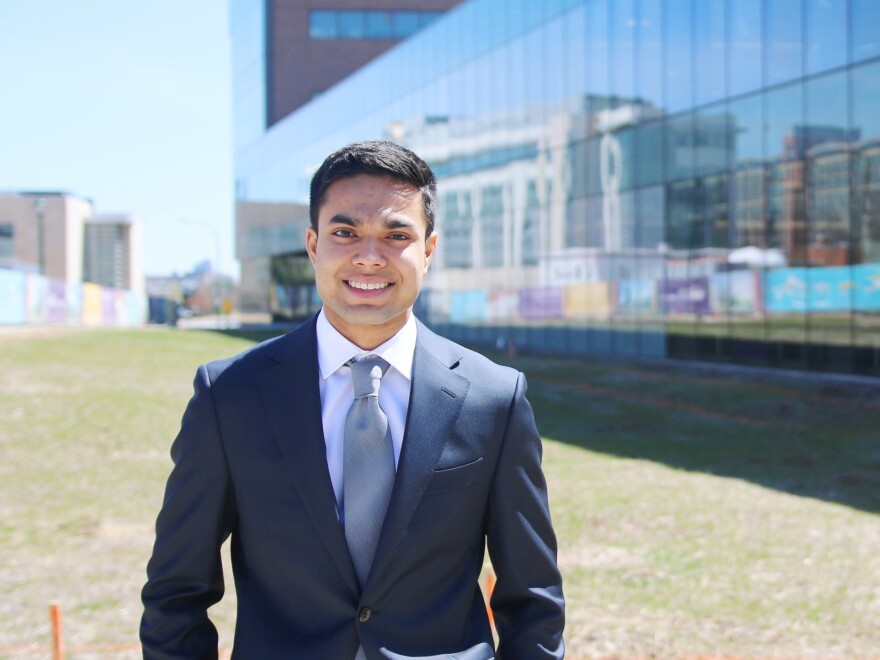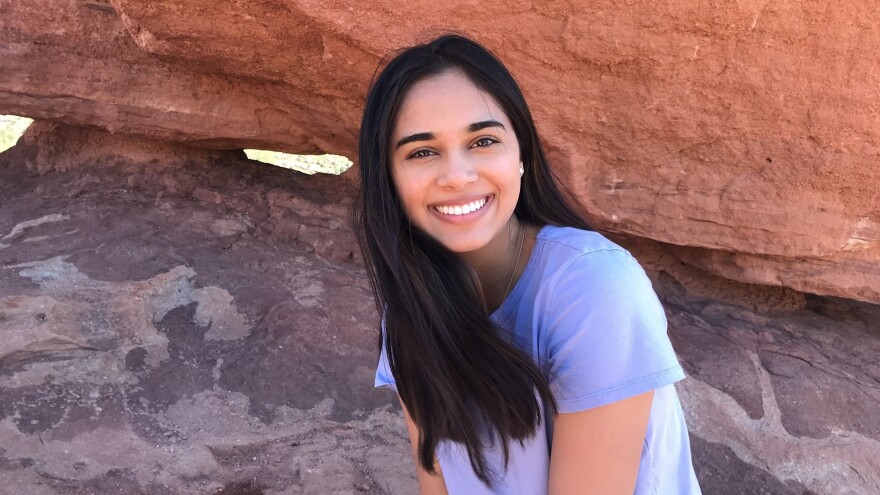Updated August 4, 2021 at 8:21 AM ET
Pareen Mhatre, 21, is set to graduate sometime next year. A biomedical engineering major at the University of Iowa, she's hoping her degree will lead to a career developing medical devices, particularly for rural populations.
"Before the pandemic, I was actually a volunteer there, and I was able to witness the top-tier care that the hospital staff provided to the patients along with the technology that is used," she says. "I want to be able to help these populations get the medical care that they deserve."
Mhatre was born in India but has spent almost her entire life in Iowa City, growing up on the university's campus. She has never known a life outside the United States, but she could soon be forced to leave if she can't find a way to stay in the country legally.
Her parents legally immigrated to the U.S. to study at the University of Iowa when she was only 4 months old. They were eventually sponsored by the university on temporary work visas, allowing Mhatre to stay on a dependent visa status. But under current immigration policy, she is no longer eligible to remain on her parents' visa after turning 21.
It's a conundrum that around 200,000 dependent visa holders across the U.S currently face — "aging out" of a valid status because of a long or nonexistent path to permanent residency.
Mhatre approached her 21st birthday with reluctance and worry, she says — her family had to scramble to find another option for her to stay and continue her education. She's now on a student visa.
"But once I graduate, I'll have to find an employer to sponsor a work visa, or I'll have to leave," she says.
Overstaying her visa could have dire consequences, like being put into deportation proceedings. She could stay for a few more years if she gets an employer to sponsor a work visa — but those visa numbers are limited.
"We urgently need a solution, because the immigration system currently has no mechanism to protect us," says Dip Patel, a Canadian citizen who grew up in southern Illinois.

Patel's parents are foreign investors whose type of visa offers few options for family members to get green cards. Patel aged out of his parents' status when he turned 21 and found a way to continue staying in the U.S. through a temporary work visa.
He insists that more permanent measures are needed for people like him and founded the organizationImprove The Dreamto advocate on their behalf. Mhatre is also involved with the organization.
Since 2017, Patel has grown an extensive community of other dependent visa holders who call themselves "Documented Dreamers."
"While growing up, I was often asked, 'Why don't you just apply for citizenship?' " he says. "Hearing this repeatedly made me realize that most Americans weren't aware that it was possible for an immigrant child to be brought here at a young age, be educated and raised here and still have no clear path to citizenship."
It's possible to legally live in the U.S. for years with no path to permanent residency or citizenship
The situation can be unnervingly complex for young immigrants like Patel. Some immigration statuses, such as the E-2 visa Patel originally had, do not usually offer immigrants a chance to apply for permanent residency.
Others, like the H-1B skilled-worker visa, do. Over 80,000 of these visas are granted every year, often to workers with advanced degrees and specialized skills for science and technology jobs. These workers are able to bring their spouses and children to the U.S. on a dependent status called the H-4.
Mhatre is part of this second group. Her family's applications for green cards were sent in 2012. But because Mhatre and her parents were born in India, they face an extensive backlog that's particular to applicants born in India or China.
That's because the U.S. caps employment-based green cards at a certain amount every year — and grants them by country of birth. Each country is usually granted 7% of available green cards in a single year.
A majority of applicants are from India or China, according to data from the Cato Institute. The waits for these applicants can stretch into decades, with dependents like Mhatre aging out of their status before their green card applications are approved.
Mhatre's parents can keep renewing their work visas until they receive permanent residency. But Mhatre's situation works differently.
"Because I've aged out, I may not be eligible when it's my family's turn to receive their green cards," she says. She's not sure how much longer they'll have to wait.
Documented Dreamers are hoping Congress can help them
Patel says that legislation is now the only solution to their problems. This year, the American Dream and Promise Act of 2021 mapped out a path to permanent residency for undocumented immigrants, temporary protected status holders and Documented Dreamers such as Patel. It passed the House in March and now moves to the Senate for consideration.
And last month, a bipartisan group of lawmakers introduced the America's CHILDREN Act. If passed into law, it would allow dependent visa holders to maintain their status even after they turn 21.
"The children of long-term visa holders have grown up in the United States, embracing the American Dream as their own," Rep. Raja Krishnamoorthi, one of the bill's co-sponsors, said in a statement. But "the current failures of our immigration system forces them to leave before they have the chance to start their own careers and families here."
Mhatre is focusing on the new academic year that lies ahead, but at the back of her mind, she says, reluctant plans of possibly leaving America are beginning to form.
"I've thought about what would happen if I ever have to self-deport," she says. "What would my future look like? What would I do? I would be leaving my friends and parents only because of our immigration laws. And it seems extremely unfair."
Hafsa Fathima and Hadeel Al-Shalchi produced and edited the audio interview.
Copyright 2022 NPR. To see more, visit https://www.npr.org.


